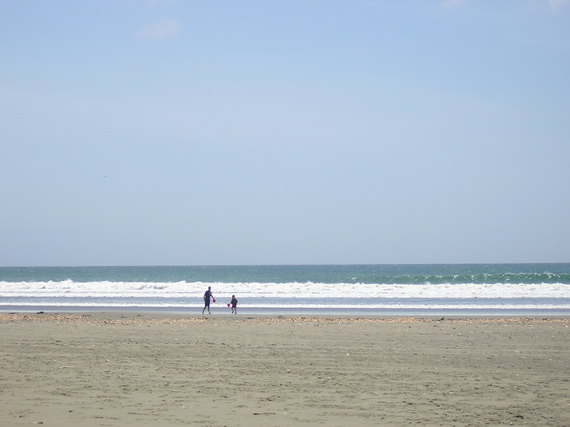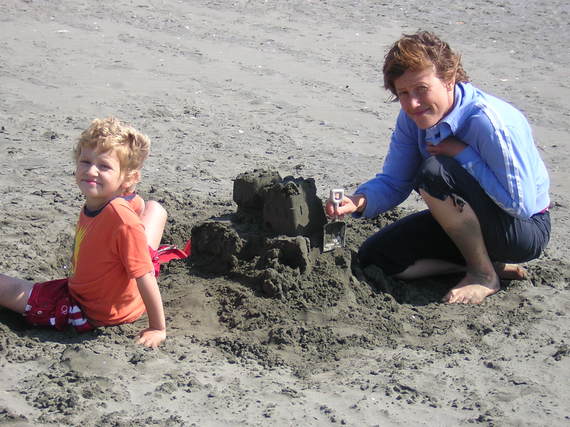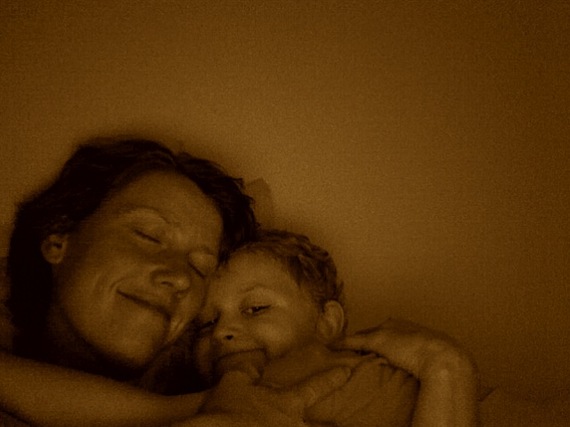There is a place where the sun sets, where you can talk to those who have died. They will not answer you, but you can speak into their silence and your words will travel through air that is filled with the possibility that you are being heard.
This place is called The Pacific Coast, and once there, you will find that you have no goals except to feel the wind, listen to the silence and witness the passing of time.
I bicycled 1,200 miles of this coast in the fall of 2009. My 6-year-old son died that summer, and I was alone for the first time in my life. Not the alone that you find in a quiet moment with a cup of tea and a book. I mean the alone that follows you into crowded rooms and pushes everyone away.
I cycled the coast because the ocean did not care if I screamed at it. All those thoughts that were inside me, that people are not supposed to think, and all those feelings that surged through me that people are not supposed to feel, were safe to give to the sea. It was there, at Cape Perpetua on the Oregon Coast, that I learned that even though the dead do not speak, it is OK to talk to them.
When I was young, I found first love on the coast, and we consummated our desires on the shore, to the rhythm of the waves, under the perfect moon, beneath the tail of Halley's comet.
Years later, we often returned to the beach for our vacations, this time with our only child, Vasu.
Vasu loved the beach. He loved sandcastles and the way sand felt in his hands.
On the beach, a lump of sand transformed into fortifications that had to be defended against invading hordes. On the beach, the wind and tides scoured away yesterday's creations and beckoned new ones to be made. On the beach, just below Cape Perpetua, Vasu's daddy and I took Vasu for our last family vacation together.
A month earlier, we had walked away from the oncologists that had kept Vasu alive since his diagnosis of cancer at 18 months old. Although the hospital saved his life many times, it was an ever-present reminder to me that he was always on the verge of dying. For years, I smiled for the oncologists, pretending I was grateful, because they were trying to help. I showed them the surface me, but the deep-inside me was something quite different.
I had been hiding the deep-inside me for as long as I can remember. I hid behind my smile and my strength. I worked hard to only show the part of me that some people name courageous and brave.
But after Vasu died, I had no resilience left in me to smile. So I fled to the ocean, which was too vast to fill with my tears. I sat by the sea, because the sounds of mothers grieving are captured on the wind and then returned with the storms every fall, mingled together, a cacophony of sorrow blasting the coast.
Cycling the coast I learned many things about pain. Pain taught me how important sorrow is. It magnifies, intensifies and flavors every emotion we have. Sorrow makes joy ooze instead of flash flood, so that joy takes a long time to feel. Sorrow changes anger, adding the entirety of your past into one great big awful sucker-punch. Sorrow mixes tears into your laughter.
During those long months, I cycled with tears, walked the beaches with tears, sat under my ten-foot tarp in the rain with tears. I woke every night, because Vasu was not in my arms, where he had always slept. Then I wept tearless sobs that rocked me back to sleep.
There were so many reasons to cry.
I tried to remember happier times. I tried to find those threads of memory that would take me to Vasu's laugh, his scent, his beautiful blue eyes. But whenever I pulled up the happy times, my mind would suddenly fill with his last breaths, and I would reach as if I could hold him in this world.
Everything was tangled inside me. His death, his absence and all the memories of who he once had been. To remember one meant reliving the others.
To live without his death weighing me down meant I had to live with his life not lifting me up. I had no choice to keep one and not the other. They were tangled.
To let Vasu go, I would have to forget who he was.
Was I allowed to forget?
How often had I heard parents proclaim that they would remember forever? People are praised for their memorials to their dead. Parents who create foundations in their children's names are heroes.
What was a mother who deliberately let her son's life fade away? What kind of person would I become if I did? Would I ever be able to find those memories again?
I was scared. Scared that if I stopped trying to remember, I would lose Vasu entirely. Scared that if I didn't forget him, I would forever remember only his last breaths.
I don't think I would call it letting go. It felt more like giving in.
It didn't take long. For some reason, the memories wanted to go more than they wanted to stay. I promised myself I would never regret. Regret only leads to more pain.
I stopped pursuing my memories of Vasu, relaxing into forgetfulness, but they didn't leave me entirely. They would come and go on whatever schedule they were on, or whatever random stimulation brought them up. I considered them gifts, just for me, and resigned myself to his absence when they were gone.
Those memories weren't what I desired most anyway. What I wanted was the memory of recognition.
I wanted that feeling I would get when my eyes saw him playing and I knew he was my son. I wanted the high I would feel when his head rested on my chest and I could smell the fragrance of Vasu and know that he was my son. I wanted the thrill of the instant response I had when I would hear his voice and turn without thinking because my body knew he was my son.
Instead, I spoke to the air and imagined that he could hear me. It filled some of the silence he left behind.
As the recognition of who he was continued to fade, my conversation with him began to connect to other things. Trees laughed in the wind the way he used to laugh. Sunlight hugged me close the way he used to snuggle in my arms.
I now talk to the wind, and smile at the sun, just in case Vasu might see that I still love him, still need him, still always feel a little alone because he is gone.
It's been five years since his death. I spent nearly two years without memories of him, just darkness where the memories should have been. But recently, many of the memories have begun to return -- and with them just a touch of recognition. My body responds to the memories with little tugs and pulls that are similar to what it was like when he was present.
Like the day when he was 2 years old and I took him to the beach on a whim. I had spent most of that year learning how to be the mother of a toddler with cancer and also watching my mom slowly eaten away by her own tumors. They had both been diagnosed with cancer only a month apart. After nine months of treatment, Vasu was in remission and Mom was dying.
I took Vasu to the beach that day because I needed a vacation from death.
The sun was toasting the rocks that I leaned on. Vasu wandered down to the water's edge. The Puget Sound was calm, and wavelets lapped at the shore. Vasu sat and tossed pebbles into the water. I closed my eyes and let the sun evaporate my fear of Mom's death -- re-opening them often to keep an eye on Vasu.
At one point, I realized that the tide must have shifted and was coming in. Vasu was still sitting by the water, but the wavelets seemed closer than before. I stood and wandered down to him. As I drew near, a cluster of larger waves struck and Vasu was abruptly waist deep in salty coolness.
But it wasn't panic that made me swoop him up. It wasn't fear that burst into sound. I heard laughter.
Wild, unleashed happiness.
And it was coming from me.
Vasu turned in my arms, surprised at the sound. His almond-shaped blue eyes gazed into mine. His hands drew up to my cheeks, and in a hushed tone, as if he had found a long lost treasure, he said "Happy Mama."
I can almost feel his hands on my cheeks just thinking about it.
This fall I will be cycling the coast again, my end point Cape Perpetua. This time it will be a road full of memory.
I will stand on the top of the cliff over-looking the sea and talk to Vasu there. Because the ocean is a safe place to let all those things that are inside come out.


